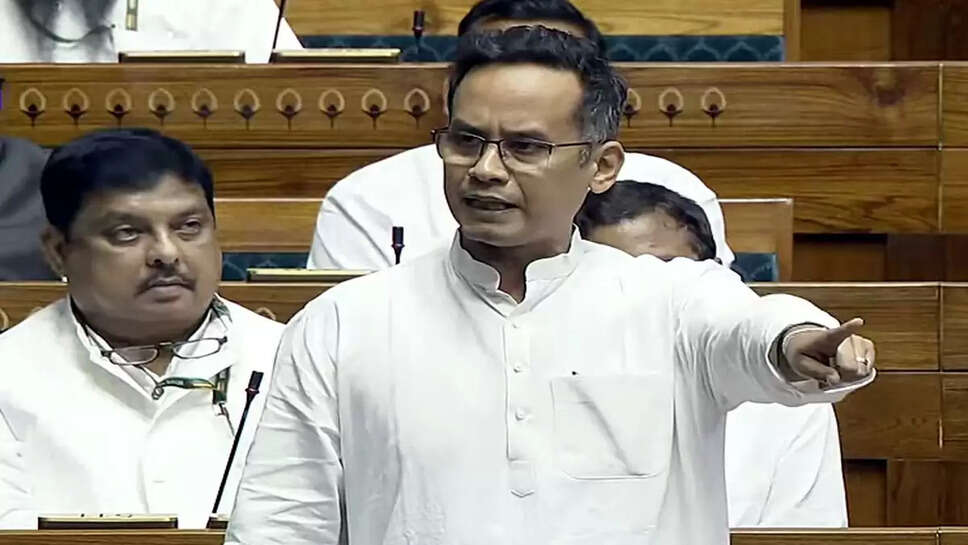Congress Slams Government Over VP Rift, Warns Against Executive Overreach

In a politically charged moment that has sent ripples across the national capital, senior Congress leader Gaurav Gogoi has made a bold assertion: the resignation of Vice President Jagdeep Dhankhar points to an emerging and uneasy fissure between the constitutional office and the central government. Gogoi’s remarks come at a time of heightened political temperature and have once again ignited debates about institutional independence, executive overreach, and the role of constitutional offices in contemporary Indian democracy.
The Congress, Gogoi says, will stand firm in its resolve to defend the dignity of the Vice President’s office, regardless of who holds it. His statement is not just a political jab, but a broader call to protect the spirit of constitutional democracy, which he believes is under threat.
A Constitutional Crisis Brewing?
While Jagdeep Dhankhar’s resignation (symbolic or real) has not yet been officially acknowledged, the very suggestion of a Vice President stepping down amid tension with the government has captured public imagination. The Vice President of India is not only the second-highest constitutional authority but also the Chairperson of the Rajya Sabha — a post that demands neutrality, restraint, and statesmanship.
According to Gogoi, the nature of Dhankhar’s exit — whether compelled or voluntary — reflects deep discomfort in the functioning dynamics between the executive and constitutional institutions. “This is not about one individual,” he said, “It is about the institutional sanctity and the erosion of checks and balances. If even the Vice President feels cornered or sidelined, then where is our democracy headed?”
The Role of the Vice President: Balance, Not Bias
The Vice President’s role is often seen as ceremonial, but in practice, it is vital to the smooth functioning of parliamentary democracy. As the Rajya Sabha Chairperson, the Vice President is expected to mediate, moderate, and ensure that legislative debates occur with decorum and fairness.
Gogoi alleged that pressure has been mounting on constitutional officers to toe the government’s line. “When a Vice President starts to question or assert independence, friction with the executive follows. This is a dangerous precedent,” he added. His worry stems from a larger trend he perceives — the centralization of power and the undermining of autonomous institutions.
Congress Positions Itself as the Defender of Institutions
The Congress party, over the last few years, has consistently raised alarms about what it calls the “institutional capture” of various democratic bodies — from the judiciary and Election Commission to statutory regulators and constitutional offices.
Gogoi’s latest intervention fits into this broader strategy. “We are not defending individuals. We are defending institutions,” he stressed. “Tomorrow it may be the CJI, the President, or the Chief Election Commissioner. The pattern is clear — dissent is silenced, and loyalty is rewarded. This is not how a constitutional democracy works.”
He pointed out that India’s founders envisioned constitutional posts as neutral arbiters, not as tools of political patronage. “Our job as an opposition party is to ensure these ideals are not buried under majoritarian arrogance,” he said.
Political Significance and Timing
The timing of Gogoi’s remarks is no accident. With elections in several key states approaching and the 2026 general elections not far off, the Congress is keen to position itself as a credible defender of constitutional values. By taking a stand on this issue, the party hopes to appeal to middle-ground voters who may be disillusioned with what they perceive as excessive centralization of power.
Moreover, it allows the Congress to shift the narrative away from routine political sparring to one that touches on the very soul of Indian democracy — institutional respect and balance of power. The party hopes to tap into the growing unease among civil society, retired judges, and public intellectuals who have been voicing concerns about the diminishing space for independent functioning of constitutional bodies.
A Deeper Malaise?
Gogoi also hinted at a deeper malaise within the government’s inner circle. He questioned whether the unease with the Vice President was a one-off incident or part of a broader pattern. “We saw similar dynamics with the previous Speaker, with dissenting governors, and even with bureaucrats who choose to speak out. The message seems to be — fall in line or fall out,” he remarked.
This, he warned, is not sustainable in the long term. A democracy is not just about winning elections; it’s about upholding the institutions that sustain public trust.
The Way Forward: Dialogue, Not Domination
While the political back-and-forth is likely to intensify in the coming weeks, Gogoi offered a message of hope as well. He urged the government to engage in genuine dialogue with all constitutional authorities and restore faith in the sanctity of such positions. “It’s not too late to course-correct. But we must recognize the warning signs. Institutions are not built in a day, but they can collapse overnight if we stop respecting them.”
He called upon citizens, activists, legal experts, and other political parties to rally for institutional integrity, irrespective of party lines. “This is bigger than politics. This is about the future of Indian democracy.”
A Tipping Point or a Wake-Up Call?
The Vice President's resignation — whether symbolic or substantive — may well mark a turning point in India’s democratic journey. If the second-highest constitutional authority feels stifled, it raises urgent questions about the health of the Republic.
Gaurav Gogoi’s forceful intervention, and the Congress party’s assertion that it will defend constitutional dignity, reintroduce an important conversation into the mainstream: are our institutions functioning independently, or are they under siege?
Only time will tell whether this episode serves as a wake-up call or slips into the ever-expanding folder of political controversies. But for now, the spotlight is firmly on the balance of power — and the role of those willing to fight for it.
